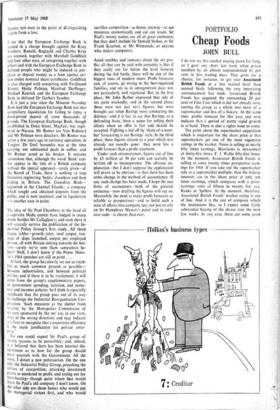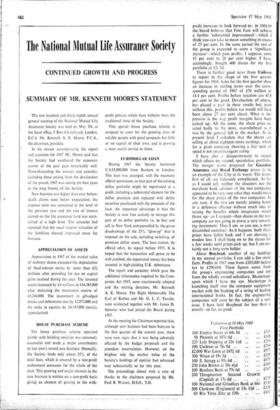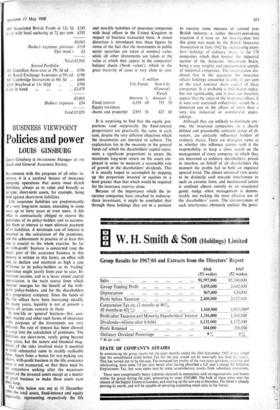Cheap Foods
PORTFOLIO JOHN BULL
I do not see this market staying down for long, so I gave one cheer last week when prices tumbled by an almost unprecedented 61 per cent in five trading days. That gives me a chance, for instance, to get into Associated British Foods at a less exalted level than seemed likely following the very interesting announcement fast week. Associated British Foods has acquired the outstanding 20 per cent of Fine Fare which it did not already own, turning the group as a whole into more of a supermarket and less of a bakery. At the same time, profits forecast for this year and next indicate that a period of pretty rapid growth is at hand. There is also a rights issue to come.
The point about the supermarket acquisition which is important for the share price is that supermarkets get one of the most expensive ratings in the market. Tesco is selling at nearly fifty times earnings, Morrisons (a newcomer) at thirty-fiiie times, F. J. Wallis fifty-five times. At the moment, Associated British Foods is selling at some twenty times prospective earn- ings for 1968. If you take out the supermarket side at a supermarket multiple, then the bakery interests are in the share price at only ten times earnings, which compares with a price- earnings ratio of fifteen to twenty for, say, Ranks or Spillers. At the moment, therefore, Associated British Foods' market rating is out of line. And it is the size of company which the institutions like, so 1 expect some fairly substantial buying of the shares over the next few weeks. In any case, there are some good profit increases to look forward to: in 1968-69 the board believes that Fine Fare will achieve a further 'substantial improvement'—which I think you can take to mean something in excess of 25 per cent. In the same period the rest of the group is expected to score a 'significant increase'—which puts profits, I suppose, some 15 per cent to 20 per cent higher. I have, accordingly, bought 400 shares for my first portfolio at 12s 3d.
There is further good news from Unilever to report in the shape of the first quarter figures for 1968. Sales for the first quarter show an increase in sterling terms over the corre- sponding period of 1967 of £70 million or 14.4 per cent. Profits before taxation are 45.8 per cent to the good. Devaluation, of course, has played a part in these results -but, even without this, profits before tax would still have been about 27 per cent ahead. What is im- pressive is the way profit margins have been jacked up. All the same, the share price re- acted badly to the news, overwhelmed as it was by the general fall in the market. At its present level I calculate that the shares are selling at about eighteen times earnings, which for a giant company showing a fair turn of speed is not an extravagant rating.
I have also a disappointment to record which affects my second, speculative, portfolio.
The merger terms proposed for Guardian Assurance and Royal Exchange prove to be an example of the City at its worst. The terms.
first of all, are hideously complicated. As far as I could tell, neither the directors nor the merchant bank advisers of the two companies
appeared to be very sure what they would mean
for the share prices of the two companies. In any case, if the two are merely joining hands in a defensive alliance without much idea of seizing the benefits which integration would throw up—as I suspect—then shares in the new company are not going to prove a very reward- ing investment. Thus I am, as you see, a most dissatisfied customer. As it happens, both share prices have fallen back and I am- showing a modest loss. I shall hang on to the shares for a few weeks until prices pick up, but I am cer- tainly not a long-term holder. About Brayhead, another of my holdings in my second portfolio, I can add a few more facts. Profits in 1967 rose from £203,000 before tax to £290,000. These figures come from the group's engineering companies and not from the wholly owned subsidiary, Mastertape. upon which I have my eye. Mastertape is launching itself into the computer equipment market with the backing of a string of leading international banks. In fact, the engineering companies will soon be the subject of a new issue. I have held Brayhead for less than a month—so far, so good.
Valuation at 14 May 1968 First Portfolio
100 Empire Stores at 64s 3d • • . • £321 50 Phoenix at 187s 6d .. • . • •
£46S
225 Lyle Shipping at 23s lfd • • • • £260 100 Unilever at 78s 9d .. • • • £394 £2,000 War Loan at £471 xd .. • • 1957 300 Witan at 19s 3d .. . £289 100 E. Scragg at 95s 6d .. • • • • £477 250 John Brown at 39s 44(1 . • f495 100 Barclays Bank at 77s 6d £387 200 Throgmorton Secured - Growth (Capital) at 17s 6d £175 100 National and Grindlays Bank at 66s £330 500 Clarkson (Engineers) at 13s 1141 . . £328 60 Rio Tinto Zinc at 139s .. • • £402 400 Associated British Foods at 12s 3d £245 Cash with local authority at 71 per cent £535 ,f6,063
Deduct: expenses: previous £119
This week's £3 Total £5,941 Second Portfolio
100 Guardian Assurance at 39s 3d xd £196 40 Royal Exchange Assurance at 95s xd £190 300 Cambridge Instrument at 40s 3d .. £604
1,000 Brayhead at lls 100 £594 Cash in hand £3,479 £5,063
Deduct: expenses £34
Total £5,029








































 Previous page
Previous page